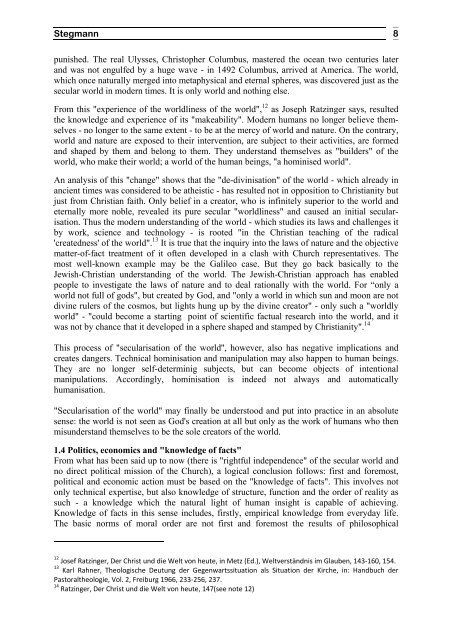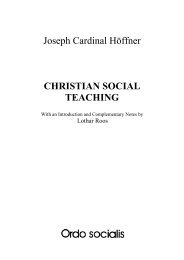Prof. Franz Josef Stegmann Bethlehem Social ... - Ordo Socialis
Prof. Franz Josef Stegmann Bethlehem Social ... - Ordo Socialis
Prof. Franz Josef Stegmann Bethlehem Social ... - Ordo Socialis
You also want an ePaper? Increase the reach of your titles
YUMPU automatically turns print PDFs into web optimized ePapers that Google loves.
<strong>Stegmann</strong><br />
punished. The real Ulysses, Christopher Columbus, mastered the ocean two centuries later<br />
and was not engulfed by a huge wave - in 1492 Columbus, arrived at America. The world,<br />
which once naturally merged into metaphysical and eternal spheres, was discovered just as the<br />
secular world in modern times. It is only world and nothing else.<br />
From this "experience of the worldliness of the world", 12 as Joseph Ratzinger says, resulted<br />
the knowledge and experience of its "makeability". Modern humans no longer believe themselves<br />
- no longer to the same extent - to be at the mercy of world and nature. On the contrary,<br />
world and nature are exposed to their intervention, are subject to their activities, are formed<br />
and shaped by them and belong to them. They understand themselves as "builders" of the<br />
world, who make their world; a world of the human beings, "a hominised world".<br />
An analysis of this "change" shows that the "de-divinisation" of the world - which already in<br />
ancient times was considered to be atheistic - has resulted not in opposition to Christianity but<br />
just from Christian faith. Only belief in a creator, who is infinitely superior to the world and<br />
eternally more noble, revealed its pure secular "worldliness" and caused an initial secularisation.<br />
Thus the modern understanding of the world - which studies its laws and challenges it<br />
by work, science and technology - is rooted "in the Christian teaching of the radical<br />
'createdness' of the world". 13 It is true that the inquiry into the laws of nature and the objective<br />
matter-of-fact treatment of it often developed in a clash with Church representatives. The<br />
most well-known example may be the Galileo case. But they go back basically to the<br />
Jewish-Christian understanding of the world. The Jewish-Christian approach has enabled<br />
people to investigate the laws of nature and to deal rationally with the world. For “only a<br />
world not full of gods", but created by God, and "only a world in which sun and moon are not<br />
divine rulers of the cosmos, but lights hung up by the divine creator" - only such a "worldly<br />
world" - "could become a starting point of scientific factual research into the world, and it<br />
was not by chance that it developed in a sphere shaped and stamped by Christianity". 14<br />
This process of "secularisation of the world'', however, also has negative implications and<br />
creates dangers. Technical hominisation and manipulation may also happen to human beings.<br />
They are no longer self-determinig subjects, but can become objects of intentional<br />
manipulations. Accordingly, hominisation is indeed not always and automatically<br />
humanisation.<br />
"Secularisation of the world" may finally be understood and put into practice in an absolute<br />
sense: the world is not seen as God's creation at all but only as the work of humans who then<br />
misunderstand themselves to be the sole creators of the world.<br />
1.4 Politics, economics and "knowledge of facts"<br />
From what has been said up to now (there is "rightful independence" of the secular world and<br />
no direct political mission of the Church), a logical conclusion follows: first and foremost,<br />
political and economic action must be based on the "knowledge of facts". This involves not<br />
only technical expertise, but also knowledge of structure, function and the order of reality as<br />
such - a knowledge which the natural light of human insight is capable of achieving.<br />
Knowledge of facts in this sense includes, firstly, empirical knowledge from everyday life.<br />
The basic norms of moral order are not first and foremost the results of philosophical<br />
12<br />
<strong>Josef</strong> Ratzinger, Der Christ und die Welt von heute, in Metz (Ed.), Weltverständnis im Glauben, 143‐160, 154.<br />
13<br />
Karl Rahner, Theologische Deutung der Gegenwartssituation als Situation der Kirche, in: Handbuch der<br />
Pastoraltheologie, Vol. 2, Freiburg 1966, 233‐256, 237.<br />
14<br />
Ratzinger, Der Christ und die Welt von heute, 147(see note 12)<br />
8















